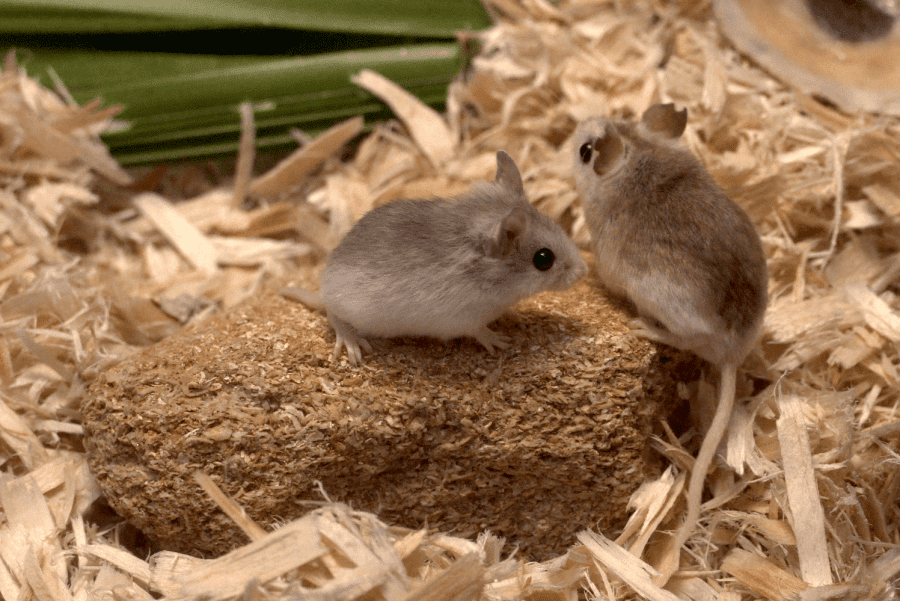

These Perdido Key beach mice are father and son! This young pup is part of the newest generation of mice at Brevard Zoo.
Editor’s note: This blogpost is the second in a series on the process of breeding critically endangered Perdido Key beach mice at Brevard Zoo, one of three zoos that have taken on this project. To read part one, please visit this blogpost.
A new generation of Perdido Key beach mice were born recently at Brevard Zoo – not with a wail, but with the shush of shifting sands.
Brevard Zoo is one of three Florida zoos carefully breeding these critically endangered mice. In November 2021, 16 mice were carefully matched and placed in habitats as pairs with the hopes they would breed and supplement the population of beach mice that serves as a reserve guarding against any threats to the population on Perdido Key. This species is so important to the coastal dune ecosystems in Florida and Alabama that any dip in Perdido Key’s beach mice population could have negative consequences.
Of the eight pairs, five mice have been born so far to parents Sunny and Caroline, and Dewy and Frida, said Mollie Lentini, the Zoo’s Conservation Manager. This adds to the 268 mice that have been born at the Zoo since we joined the conservation breeding program in 2007.
Our conservation team has kept a careful eye for beach mice pups during their daily care of their habitats as well as by watching night-vision cameras set up outside of their habitats. These nocturnal creatures are not easy to spot!
While cleaning our mice habitats, our team notes any increase in footprints in the sand as well as an increase in droppings (especially smaller droppings). If they see either of these signs, our staff will spend some extra time scouring videos of those habitats.
“The babies also tend to behave differently than the adults,” Mollie said. “They’re like little popcorn and pretty spazzy when they first come to explore the surface.”
Baby mice stay in the nest, or burrow, built by their parents for about two weeks while they nurse from mom. They don’t usually come to the surface of their habitat until they can be on their own and forage.
Dad is moved to a separate habitat fairly soon after his young are visible. The parent mice can breed again within 24 hours of the female giving birth, so there’s the possibility that she’s pregnant again. We do our best to keep her healthy and from having too many babies.
The young are moved from mom and into sex-specific habitats soon after becoming independent.
Perdido Key beach mice breeding in human care is carefully managed by a studbook keeper and a geneticist to ensure that this population is as diverse and healthy as possible.
We notify the studbook keeper about the pups once we begin moving the new mice to habitats of their own. Each are assigned numbers from the studbook keeper as well as our Zoo’s animal registrar. Genetic sampling is done when the pups get their first physicals.
These babies are ambassadors of their species. They will continue to live at the Zoo unless the mouse population on Perdido Key decreases substantially this year. This can happen because of a natural disaster like a hurricane or a manmade occurrence like development in their habitat.
“If they are not needed for release, they will remain with us at the zoo,” Mollie said. “We will continue to learn about the amazing behaviors of the Perdido Key beach mouse, which helps us to better understand how to protect them in their natural range!”
Our current plan is to also keep the parent mice at the Zoo. Sometimes these mice can become outreach mice with the U.S. Fish and Wildlife Service. Brevard Zoo also partners with Palm Beach Zoo and the Santa Fe College Teaching Zoo, so these mice residents occasionally live at a different Zoo.
“There are no plans for any of ours to go in the near future,” Mollie said.
Thank you to Surfing’s Evolution & Preservation Foundation! Their generosity makes this critical conservation breeding program possible.
Brevard Zoo is an independent, not-for-profit organization that receives no recurring government funding for our operating costs. Your generous support enables us to continue to serve our community and continue our vital animal wellness, education and conservation programs.
